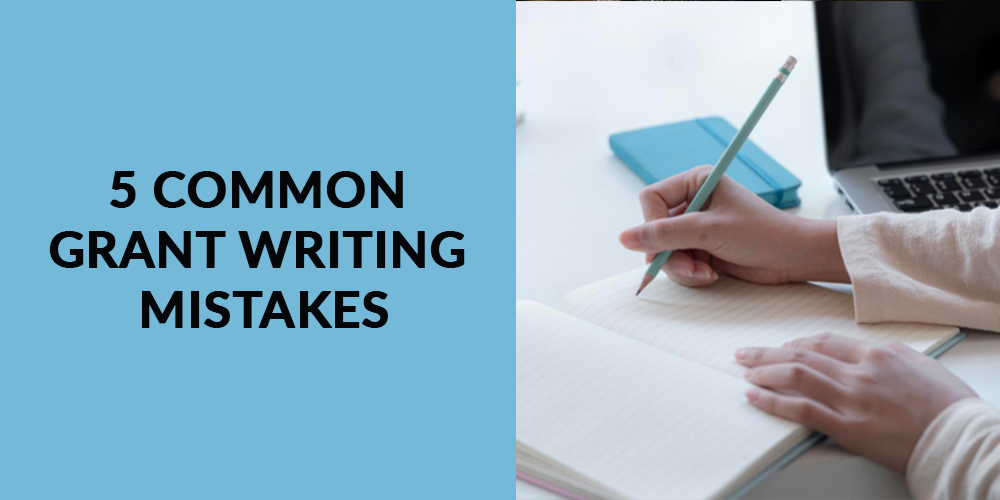5 Common Grant Writing Mistakes
Grant writing can be a daunting task, but with a little know-how, it can be relatively easy to score funding for your project. However, there are some common mistakes that grant writers make when writing applications that can significantly decrease their chances of getting funded. In this article, we will explore 5 of the most common grant writing mistakes so that you can avoid them in your next application.
Common Mistake #1: Not Doing Your Research
One of the most common mistakes made by grant writers is not doing their research. This can lead to numerous problems, including not being able to find the right funding sources, not understanding the requirements of the grant, and not being familiar with the process. Not doing your research can also mean that you are not aware of the competition. There are often many other organizations vying for the same grant money, and if you don’t know who they are or what they’re doing, you won’t be able to put your best foot forward. Finally, not researching can also lead to a lack of creativity in your proposal. If you don’t take the time to understand the organization and what they’re looking for, you may miss out on an opportunity to present something truly unique and impactful. </p
As a grant writer, you may also decide to use statistics to support your case for why your organization or project should receive funding.
There are a few things to keep in mind when researching statistics:
- First, make sure the statistics you use are from reputable sources. This will give your argument more weight and make it more likely to be successful.
- Second, don’t over-complicate things. Use simple language and easy-to-understand visuals like graphs or charts to present the data in a way that is digestible for the reader.
- Finally, don’t forget to put the data into context. Explain why the numbers matter and their relevance to your organization, project or the services that you provide. By doing this, you’ll paint a complete picture for the grant committee and increase your chances of getting funding approved.
Common Mistake #2: Not Following the Guidelines
Another common mistake made by grant writers is not following the guidelines. This can be a costly mistake, as it can lead to the rejection of your grant writing application. There are a few things you can do to avoid this mistake. First, make sure you read and understand the grant guidelines before you start your grant writing response. Pay close attention to any requirements or restrictions that are listed. If you have any questions, be sure to ask them before you start writing. Second, follow all the instructions in the grant guidelines. This may seem like a no-brainer, but it’s important to remember that even small details can matter when it comes to grant writing. Make sure you include all required information and attach any requested documents.
Common Mistake #3: Not Proofreading M/h3>
If you’re a grant writer in Sydney you know that one of the most important parts of your job is proofreading. Unfortunately, it’s also one of the elements of grant writing that is most frequently disregarded.
Here are three common mistakes that grant writers make when it comes to proofreading:
- Not reading the entire document. When you’re proofreading, it’s important to read through the entire document carefully, from start to finish. This will help you catch any errors that might be missed if you only skim the document.
- Not using a spell checker. A spell checker can be a helpful tool when you’re proofreading a document. It can help you catch spelling errors that you might otherwise miss.
- Not taking your time. Rushing through the proofreading process is a recipe for disaster.
Common Mistake #4: Not Being Clear and Concise
Being brief and straightforward when writing grants is essential. To obtain financing, grant writers must be able to express their ideas succinctly. Unfortunately, many grant writers make the mistake of being unclear and verbose in their proposals. This can lead to confusion on the part of the reviewers and ultimately result in the proposal being rejected. To avoid this common mistake, grant writers need to focus on clarity and conciseness. They should use simple language and short sentences to communicate their ideas effectively. Additionally, they should make sure that their proposals are well-organized and easy to follow. By taking these steps, grant writers can increase their chances of having their proposals accepted.
Common Mistake #5: Not Tailoring Your Proposal
It’s crucial to personalise your grant proposal to the particular organisation or funding opportunity you’re appealing to when you’re grant writing. Grant writers frequently make the error of not customising their proposals, which might result in the application being denied. By taking the time to tailor your proposal, you can increase your chances of success.
Here are some tips on how to tailor your proposal:
- Research the organization or funding opportunity you are applying to. This will help you understand their mission and what they are looking for in a proposal.
- Make sure your proposal aligns with the organization or funding opportunity’s goals and objectives. Your proposal should demonstrate how your project will help them achieve their goals.
- Use language that is appropriate for the audience you are writing for
If you avoid these 5 common mistakes when grant writing, you will greatly improve your chances of getting funded. You might find it handy to add these 5 points to your final checklist for your grant writing submission, just to ensure you remember them as you are completing your grant writing responses. With careful planning and execution, you can increase your chances of success in securing funding for your next project.

